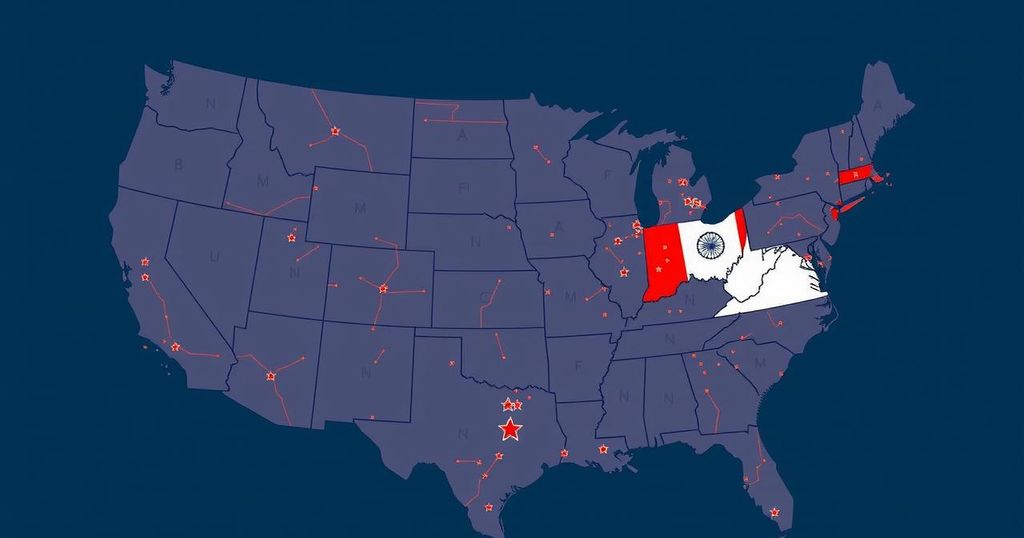Concerns Over Chinese Influence Campaigns and U.S. Election Integrity
Recent allegations concerning Chinese influence campaigns highlight rising fears of foreign interference in the U.S. elections, primarily targeting Republican candidates known for opposing China. Reports suggest that Chinese hackers compromised the phones of individuals like Donald Trump and JD Vance. Experts emphasize the vulnerability of down-ballot races and the urgent need for improved cybersecurity measures to safeguard electoral integrity amid escalating disinformation efforts fueled by advancements in technology.
Recent reports have ignited growing concerns over potential Chinese interference in the upcoming U.S. elections. Notably, a Microsoft Threat Analysis Center report disclosed that Chinese influence operations have specifically targeted several Republican candidates known for their opposition to China. While the Chinese Embassy in Washington has denied any intention to interfere, the apprehensions remain concerning. Among the alleged incidents, hackers purportedly compromised the phones of former President Donald Trump and Senator JD Vance from Ohio. This raises significant questions about how American electoral campaigns can effectively mitigate such threats. Kim Wyman, a former senior election security adviser, articulated the broader implications of foreign interference, stating, “From sort of a democracy standpoint, you can’t lose sight of the fact that the goal of our foreign adversaries, including China, is to destabilize America from within.” The Microsoft report identified a specific disinformation campaign attributed to Chinese actors, referred to as Taizi Flood, which targeted certain Republican lawmakers, including Representatives Barry Moore and Michael McCaul and Senators Marsha Blackburn and Marco Rubio. Although the campaign appeared to lack genuine engagement, it highlights the vulnerability of down-ballot races to external influence, given their generally lower levels of resources compared to higher-profile campaigns. Furthermore, cybersecurity experts have warned that foreign actors are often on the lookout for softer targets, indicating that the ongoing and increasingly sophisticated digital landscape, including advancements in artificial intelligence, complicates the narrative of foreign interference. Legislators seem to acknowledge that while some prominent Republicans remain secure in their re-election bids, down-ballot candidates may not enjoy the same level of protection. As John Cohen from the Center for Internet Security noted, foreign adversaries will exploit any vulnerabilities while seeking ways to influence perceived outcomes through elections. The call for enhanced cybersecurity measures is becoming more urgent as campaigns are encouraged to strengthen their defenses against disinformation campaigns and potential cyber threats. Advocates stress the need for robust relationships between campaigns, local law enforcement, and federal agencies like the FBI, emphasizing that successful mitigation involves swift response measures and preparedness to counteract misinformation effectively. The discourse is further contextualized by historical concerns regarding foreign influence in U.S. elections, as echoed by the Office of the Director of National Intelligence. As the threat landscape continues to evolve, it is imperative for campaigns to actively engage in sound cybersecurity practices to safeguard their electoral integrity.
The topic of foreign interference in U.S. elections, particularly concerning China, has gained prominence as election seasons approach. Recent allegations have highlighted the role of Chinese actors in executing disinformation campaigns aimed at influencing the electoral outcomes by targeting specific candidates. This has led to increased scrutiny of cybersecurity measures in political campaigns, particularly among those campaigning in lower-profile races. The advanced capabilities of technology, specifically artificial intelligence, have made these disinformation efforts both more pervasive and sophisticated, raising questions about the resilience of the U.S. political system against such influences. Previous warnings from intelligence agencies indicating that foreign nations, such as China, could exploit political polarization for their benefit further substantiate the urgency surrounding this issue.
In conclusion, the alleged Chinese influence campaigns raise alarming concerns about the integrity of the U.S. electoral system as the electoral season approaches. Reports of targeted disinformation campaigns and disconcerting hacks aimed at high-profile candidates indicate a particular threat to political stability and democratic processes. The calls for enhanced cybersecurity measures underscore the necessity for campaigns to develop robust defenses against external actors. The evolving digital landscape necessitates vigilance, collaboration, and proactive strategies to protect the sanctity of democratic elections in the United States.
Original Source: thehill.com




Post Comment